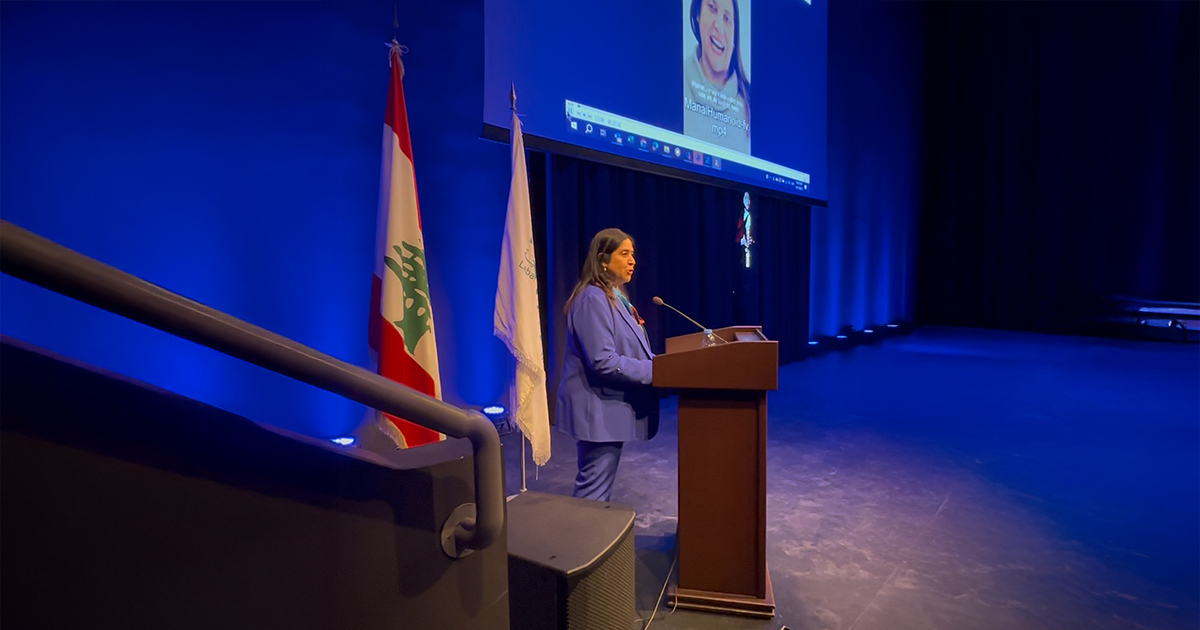The Adnan Kassar School of Business Drives Purposeful AI Adoption with “Future Forward: AI in Action”
Future Forward workshop underscores LAU’s vision for innovation rooted in ethics and impact.
The Information Technology and Operations Management (ITOM) Department at the Adnan Kassar School of Business (AKSOB), in collaboration with the Academy of Continuing Education (ACE), reaffirmed its commitment to purposeful innovation by hosting the Future Forward: AI in Action workshop.
Showcasing LAU’s leadership in preparing students and professionals for an AI-enabled future, the full-day event at the Beirut campus brought together thought leaders, policymakers, professionals and students for a hands-on, cross-sector exploration of artificial intelligence.
The event opened with a symbolic and engaging moment: The debut of ITOM Chair Manal Yunis’ twin, who humorously and insightfully engaged attendees, demonstrating in real time the potential of human-AI collaboration while reminding the audience that technology must remain rooted in human purpose and vision.
“Today is not about hype or hesitation; it is about learning, connecting, and exploring new perspectives,” said Dr. Younis in her opening remarks. “Our future is not about AI versus humans; rather, it is about how we shape it together.”
Later, in a lighthearted on-stage dialogue with her humanoid twin, Dr. Yunis reframed the conversation around AI’s societal role, noting that AI should not stand for Artificial Intelligence alone but for Augmented Intelligence, “a future where human intuition and empathy work alongside machine learning, not in conflict, but in collaboration,” she added.
These reflections underscored LAU’s commitment to ensuring technology remains anchored in ethics, creativity, and human-centered leadership.
In a keynote address, LAU President Chaouki T. Abdallah emphasized the concept of “agentic AI,” calling for universities to foster awareness, trust, and policy frameworks to ensure that AI serves as an empowering tool rather than a disruptive force. AI should not be seen merely as a tool to adopt but as an agent requiring intentional guidance, he added, underscoring higher education’s role in preparing leaders capable of steering AI’s integration into society responsibly.
MP Elias Hankash, vice president of the Lebanese Parliament’s IT Committee, highlighted mindset, training, and regulation as pillars for national AI readiness. Drawing on best practices from Jordan’s public sector and Singapore’s education system, he advocated for strategies that align technology with public interest and inclusive growth while emphasizing agile yet accountable governance.
In his intervention for the Executive track, Dr. Ayman Khalil, adjunct faculty in AI and Data Analytics at LAU, addressed the critical role of real-time human-AI interaction in fostering learning, strategic decision-making, and innovation within organizations. As governments, executives, and professionals increasingly adopt AI-driven solutions, he noted, the focus must remain on designing effective and responsible applied AI systems. By leveraging AI’s analytical capabilities while preserving human intuition and contextual expertise, organizations can create adaptive strategies that enhance governance, operational excellence, and resilience in the face of rapid technological change.
Participants experienced seven dynamic, hands-on tracks covering AI in each of healthcare, digital marketing, finance, cybersecurity, law and governance, education, and for executives.
In addition to Dr. Khalil, the sessions were led by Dr. Rana Abdel Malak, founder & CEO at MEDHEALTH Pro; Assistant Professor Ghada Awada; Instructor at LAU’s Academy of Continuing Education Omar Kandil; Dr. Omran Ghazali, CEO of ICT MENA; Dr. Ali Diab, LTC; Major Mahmoud Abu Daher; Ms. Shireen Daouk, AVP of Corporate Development MENA region at the New York Institute of Finance; Mr. Fares Antoun, Fintech lecturer; Assistant Professor of Practice Dunia Harajli; and Mr. Georges Bachaalany, LEAG AI. The experts provided participants with practical exposure to AI tools while addressing frameworks for ethical, impactful adoption.
Guest speakers from the UAE and Grenoble University (France) enriched the discussions with global insights on AI scalability, governance, and practical application. The collaboration with ACE, under the leadership of Dr. Elie Badr, vice president for Business Development and Global Affairs, ensured operational excellence and alignment with LAU’s vision to bridge academia and industry.
Future Forward: AI in Action was made possible through the support of MyMonty, OBCIDO Inc., We Deserve Better Foundation, Miele, and Ely Akiki, reflecting shared dedication to leveraging technology for societal advancement.
This event showcased LAU’s commitment to preparing Lebanon’s students, professionals, and policymakers for a future where AI and human potential coexist in synergy. By prioritizing human-centered innovation, ethics, and collaboration, AKSOB reaffirmed LAU’s role as a leader in responsible technology adoption, policy engagement, and future-ready education for Lebanon and the region.
